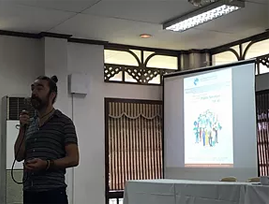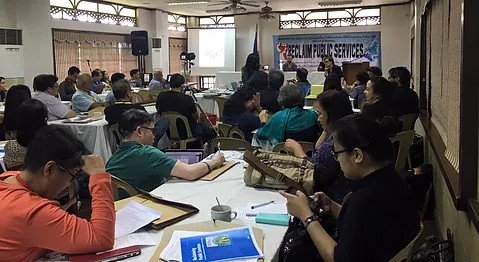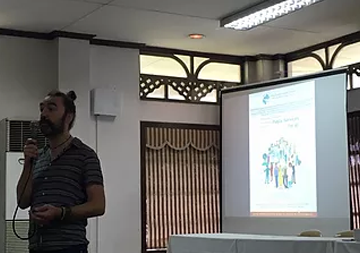Assuring affordable, accessible and quality Public Services for all: Tool for leveling inequality, mobilizing for transformative change!
February 13, 2018
Balay Kalinaw, UP Diliman, Quezon City, 13-15 February 2018
BACKGROUND

The world is riven by social injustices marked by worsening social inequality, dispossession, exploitation and exclusion. Concretely, in Asia, despite a booming economy, close to one billion people face massive unemployment and work informalisation, with barely any access to social services and support for a life of dignity. In Europe, more than 115 million people are living on the poverty line, facing indebtedness, joblessness and insecurity. However, states respond with policies that cut social services and dismantle public utilities. Institutionalised welfare programs that have served as models of development have been undermined and eroded.
Austerity Measures
The dominant development paradigm’s market-centric policies have affected the lives and livelihoods of peoples in Asia and Europe, especially the vulnerable sectors. Both regions face austerity measures driven by international public institutions, notably the International Financing Institutions, and in Europe through the European Union which has given the Commission additional powers to slash and control national public spending plans.
Even the IMF now claims to recognize that current policies increase inequality and that this harms economic growth and stability. But the IMF and World Bank continue to worsen inequality by their conditionalities which require cuts in public spending, in spite of their formal priority for poverty reduction. They also promote cutting corporate tax rates and providing generous tax and fiscal incentives, which lead to losing and forgoing badly needed financial resources for social spending. Meanwhile, to recoup these losses, the IMF, in particular,pushes the adoption/increase of regressive consumption taxes such as Value Added Taxes which unjustly burden the poor and low-income groups. Women in great numbers are in lowly paid, insecure, informal work and are thus disproportionately impacted.
This internationalization undermines and weakens democratic processes and outcomes at the national level. Social movements thus face a challenge not only of winning public support and national level political support, but also defending the democratic processes against the institutions of globalization.
Public Financing of Services and Public-Private- Partnerships
Further, in terms of the SDGs and the Addis agenda for development, the WB and OECD governments insist on Public-Private Partnerships (PPP) as the way forward. Yet cumulative evidence demonstrates that these are more expensive (and thus constrain peoples’ access), more corrupt, less efficient and less sustainable than using public finance and public sector delivery. The focus of private companies on keeping profit as the primary motive goes against the very basis of public services and even what constitutes ‘public’ and the public good. No economy can be sustainable without a robust commitment to access of the people to affordable quality public services. These services are part of social commons to which all people have a right. People, simply as human beings, have the inalienable right to essential services.

Entering into trade agreements are also promoted by the International Financing Institutions on the assumptions that these will increase Foreign Direct Investment and hence, financing for public services. However, such agreements have proven damaging to countries’ revenue base and exploitative of human and natural resources. Investments have served to extract revenue from public services to boost the returns to transnational corporations and finance capital.
Public goods and equality
All over Asia and Europe, specific public services are experiencing a serious crisis, including housing, healthcare, education, water, energy and transport (roads, railways, and ports). These services are vital and indispensable to life, to the dignity and development of individuals and society as a whole. They are public goods or social commons, and their provisioning must, therefore,be guaranteed and financed by states, from the taxes they collect, through public employment, and subject to democratic control through the participation of citizens. Where governments and local authorities fail to provide such services, or mismanage the provision of these services through corruption or negligence or under-provision, states should support the autonomous activities of people’s organizations and local communities in provisioning for public services.
Because public services are proportionately more important for poorer groups in the population, poorer people are worse affected, while the rich and private corporations remain relatively unscathed even in times of austerity. The cutbacks invariably target public employment, which further exacerbates inequality. This is because the public sector provides greater opportunities for the employment of women and of disadvantaged ethnic and other groups; and because public sector pay is more equally distributed; and because the loss of jobs affects families which depend most on income derived from employment, rather than wealthy elites who benefit more from unearned income from profits or rent.

Political Dynamics
These dynamics have also led, especially in Europe, to the rise of great public anger against political elites which are more committed to neoliberal doctrines than to the welfare of their own people. This anger shows itself in the collapse of support for traditional parties, more particularly social democracy, and a growth in support for xenophobic and authoritarian politicians, as seen in European countries such as Hungary, the Czech Republic, Poland and Austria – and in the UK’s Brexit vote – as well as in Asian countries including India and the Philippines.
Social movements are playing a vital role in building new political movements, which recognize the real social and economic problems experienced by people, but reject the divisive politics of xenophobia, while challenging the unbridled power and impunity of corporations, and their capture of economies and states. These movements are already making an impact in major cities in both continents, including Barcelona and Delhi.
Campaigning for public services and social commons is, therefore, a daunting task for Asian and European social movements. Public services require renewed and strengthened capacity for local and central governments to deliver quality services and use public finance to do so. It also involves reclaiming the strong democratic and people-centric role of the state, so that it can support and implement key demands of the social movements:
- Reverse the privatization of public goods or social commons
- Abandon the policy of using PPPs; use public finance to finance infrastructure and public services
- Advance the democratic control and management of public services, focusing on mechanisms for people’s participation and monitoring,
- Introduce legislation, if possible with constitutional underpinning, to ensure that people’s rights to public services are institutionalized and insulated from market forces and political patronage,
- Muster enough political will to abandon skewed tax policies which allow the mega-rich to hide their wealth via tax havens and illegal money flows, so that they can be taxed to finance decent public services
- Develop ‘public-people’ partnerships to support non-profit groups like cooperatives and social enterprises which can achieve more people-centered and accountable modes of social service delivery.
The rebuilding of public services is not an isolated campaign. It is linked with struggles of other democratic and progressive institutions across many sectors – for land, food sovereignty, decent work and social rights, just trade and ecological/climate justice. It is a key part of a vigorous and wide-ranging movement for systemic change to an alternative development paradigm that will place people and planet first, and at the center of development.
AIMS
Social justice is at the center of all our concerns and all our efforts to work for another world. Democracy is not possible if people do not have the feeling they have equal worth, they can have their voices heard, they can take part in decision-making with the same capacities as others. Therefore, social justice remains at the heart of all civil society’s concerns and demands for a just and fair world, and for a just and fair relationship between Europe and Asia.
There are common concerns and demands in the EU and Asia. The level of development is very different in Europe and Asia, but also within Asia and within Europe. Nevertheless, at the level of social justice and more particularly social protection, labor law and public services, the recent developments are very similar and are dictated by the same neoliberal philosophy.
Social inequality and economic disparity are realities in Asia as well as Europe. In Europe, it has meant a groundswell against the burden of ‘austerity measures’ on the shoulders of those who are at the bottom of the pyramid. In Asia, internal disparities are covered up under the mainstream discourse of national interests in the context of international disparities.
Everywhere there is a threat to the existence of, and access to, public goods and services. Therefore the aim of the conference is :
- To examine the impact of neo-liberal austerity policies on public services, and the global and regional trade negotiations
- To look at the major service sectors now being restructured
- To examine the different alternatives and on-going efforts to put back into public hands now being proposed by civil society.
- To share and learn from outstanding de-privatization campaigns and strategies. To emphasize the importance of services accessible and affordable to all for social, economic and sustainable development
What we hope to achieve is :
- A grounded understanding of the current rationale for liberalization, deregularisation andprivatization, as well as of the role of the global and national actors involved
- A clear view of the alternatives especially on finance, operation, and democratic governance
- A clear view of the challenges and opportunities that we are facing
- An outline of the different strategies on reclaiming public services that can be put into place for making our campaigns and advocacies on alternatives that are doable and concrete
- An awareness of the major elements that are important for the interlinkages with other sectors of social justice and with the other thematic clusters of AEPF.
- Concretely our immediate plans are-
- To enable the convergence and exchanges of major social movements and civil society networks, and progressive scholars and parliamentarians in Asia and Europe involved in reclaiming Public Services and related social justice concerns; and to develop an action plan for future cooperation and working together in 2018 and 2019.
- To do communications and media advocacy through media briefings before and after the conference. Further, the AEPF Communications and Visibility Team will post the following in the AEPF web and various CSO links: the conference papers, Final Statement, press releases, video clips and interviews, and photos. These will also be widely circulated in the social media, and to target outlets in the Asian and European mainstream media.
- To engage in lobby work by sharing the Final Statement and other papers to target states, regional bodies and multilateral institutions in Asia and Europe. Also holding dialogues with identified regional and national representatives and other officials.
- To help develop the AEPF’s Agenda for Parliamentarians in the ASEM by proposing an Action Plan on how progressive legislators could advance the lobby work of civil society for effective Public Services and related social justice concerns with national and regional parliaments.
The economic and social crisis we are currently living in, is in the first place a crisis of social reproduction, in a world where employment increasingly fails to support subsistence. The privatization of public services can be seen as a new enclosure, where the livelihoods of people are taken out of their hands and are turned into profit-making mechanisms. We want to contribute to new policies in which people take back control.



